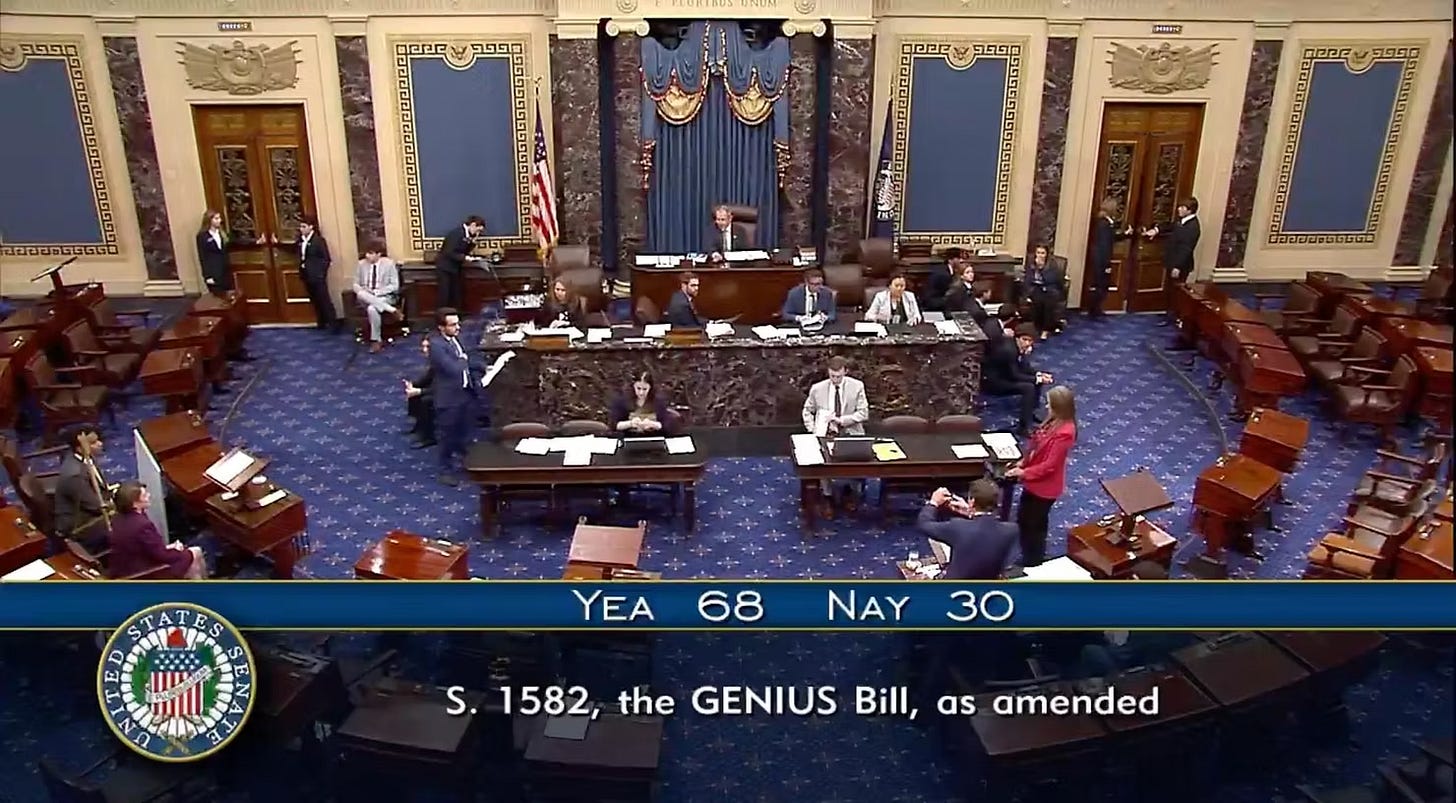The DeFi Debrief
Week of June 23, 2025: U.S. Senate Passes GENIUS Act; DEF Collaborates w/ CryptoUK; Amicus Brief in Storm Case; Project Open's SEC Submission; Market Structure hits the Senate
U.S. Senate Passes GENIUS Act
On June 17, 2025, the United States Senate officially passed the Guiding and Establishing National Innovation for U.S. Stablecoins (GENIUS) Act of 2025 with a bipartisan supermajority vote of 68-30. The GENIUS Act aims to establish a federal framework for the issuance and regulation of payment stablecoins in the U.S. Clear, thoughtful stablecoin policy is critical in securing the U.S.’s role as a global financial leader, and it would not be possible without the bipartisan leadership of Senators Bill Hagerty (R-TN), Cynthia Lummis (R-WY), Tim Scott (R-SC), Kirsten Gillibrand (D-NY), and Angela Alsobrooks (D-MD).
For more on the GENIUS Act, what's in it, what it means for DeFi, and what's next, read DEF’s analysis here.
Following the passage of GENIUS out of the Senate, President Trump called on House leadership to swiftly pass the legislation and put the GENIUS Act on his desk, where he will sign it into law. “Get it to my desk, ASAP — NO DELAYS, NO ADD ONS," Trump posted.
DeFi Education Fund is thrilled that this monumental legislation passed through the Senate. As GENIUS heads to the House, we urge you to contact your Representative to ask them to support GENIUS and vote YES on advancing our nation’s financial future. Please make your voice heard. For more information on how to contact your Representative, use this link: https://www.house.gov/representatives/find-your-representative.
DEF Collaborates with CryptoUK on DeFi Exemption in the United Kingdom
DEF was happy to collaborate with CryptoUK, one of the United Kingdom’s premier trade associations for digital assets, on their comments to the Financial Conduct Authority (FCA) on a proposed crypto regulatory framework in the UK.
In May 2025, the FCA published a discussion paper seeking views on their approach to regulating cryptoasset trading platforms, intermediaries, cryptoasset lending and borrowing, staking and DeFi, and the use of credit to purchase cryptoassets. In HM Treasury's policy note, the proposed regulatory framework provides a brief exemption for DeFi activities.
DEF assisted Crypto UK with comments on question 50, on the proposed exemption for DeFi activities, and suggested definitions for the terms “control” and “decentralized,” which are used to evaluate DeFi projects. The draft statutory instruments policy note states: “Where specified activities are being undertaken on a truly decentralised basis, i.e., where there is no person that could be seen to be undertaking the activity by way of business, then requirements to seek authorisation will not be applicable. The FCA will determine in any given case whether there is a sufficiently controlling party or parties that ought to be subject to the requirement to be authorised.”
In response, Crypto UK encourages adopting DEF’s proposed definition of “control” (e.g., “the ability or independent legal right or independent legal right to obtain upon demand data sufficient to initiate transactions spending an amount of digital assets”). If adopted, it would likely be compatible with future United States’ frameworks, and would serve as a control-based decentralization test with exclusions for DeFi activities.
“In assessing control, a reviewer should ask whether the underlying protocol remains under centralised authority – that is, whether any person or group of persons under common control has unilateral and independent authority to make changes to the protocol. In line with this, the FCA should also explicitly exclude various software providers and operators who do not exercise “control” over transactions and user assets, ensuring that these participants are not covered by the proposed definition of sufficiently controlling party under the SI. This would appropriately exclude developers and/or operators of:
Unhosted wallets;
Noncustodial peer-to-peer software protocols and applications;
User interfaces (front-end websites or applications);
Users who participate on a protocol (users,traders, liquidity providers, etc); or
Communication technologies (relayers and RPC nodes).”
DEF welcomed the opportunity to collaborate with our friends at CryptoUK on this important proposal to protect users and developers of decentralized protocols in the UK and around the world.
Paradigm Files Amicus Brief in Roman Storm Case
On June 13, 2025, Paradigm filed an amicus brief in United States v. Roman Storm, supporting the inclusion of key jury instructions related to the allegation Storm operated an unlicensed money transmitting business (MTB). In the indictment, the government claims that Storm, co-founder of Tornado Cash, operated an unlicensed MTB under criminal code provision 18 U.S.C. 1960 simply by writing and publishing noncustodial software that enabled users to engage in p2p transactions.
Paradigm argues that the government’s theory of MTB liability goes against existing laws and FinCEN 2019 guidance, pointing out that Storm didn't control user funds or charge fees, which are necessary elements of a money-transmitting business charge. The brief urges the court to adopt jury instructions requiring proof that Storm knowingly operated such a business and was aware the funds involved were tied to criminal activity. Jury instructions are critical in a criminal trial because they guide jurors on how to interpret the law, what legal standards must be met for a conviction, and what evidence they are permitted to consider.
Paradigm’s Chief Legal Officer Katie Biber emphasized that changes to criminal liability should come from Congress, not the courts. To learn more about the nuances of § 1960, you can read “Through the Looking Glass: Conceptualizing Control and Analyzing Criminal Liability For Unlicensed Money Transmitting Businesses Under Section 1960,” written by Amanda Tuminelli, Dan Barabander, and Jake Chervinsky.
Storm’s trial begins in Manhattan on July 14, 2025. The DeFi community is rallying to defend the rights of developers building non-custodial, open-source software, and support Storm and Alex Pertsev, one of the other developers of Tornado Cash:
https://freeromanstorm.com/
Project Open Submits Proposed Tokenization Framework to the SEC
On June 17, 2025, the Solana Policy Institute (SPI), Orca, Superstate, and Phantom submitted comprehensive proposed legal frameworks to the SEC’s Crypto Task Force as part of their ongoing initiative, Project Open. Project Open is a proposed regulatory framework designed to enable compliant blockchain-based issuance and trading of tokenized securities. It aims to harness blockchain technology to create more efficient, transparent, and accessible capital markets while maintaining robust investor protections.
The core message of SPI’s most recent submission is that public, open-source decentralized blockchain networks and validators do not fall within the definitions of exchanges, brokers, or clearing agencies under the Exchange Act, but can provide an appropriate infrastructure for on-chain equities issuance and trading. The filing also requests specific exemptive relief that recognizes that blockchain infrastructure operates differently from traditional securities intermediaries.
Upcoming Senate Banking Committee Hearing on Digital Asset Market Structure Legislation
On June 24, 2025, the Senate Banking Committee will hold a hearing entitled “Exploring Bipartisan Legislative Frameworks for Digital Asset Market Structure.” The witnesses in attendance will include Sarah Hammer, Executive Director, University of Pennsylvania Wharton School; Greg Xethalis, General Counsel, Multicoin Capital; and Ryan VanGrack, Vice President of Legal, Coinbase.
The hearing will be broadcast live. Team DEF will be closely monitoring the hearing.
Borderless Tokens, Boundless Jurisdiction: DEF Publishes Paper on Geofencing
DeFi Education Fund recently published “Borderless Tokens, Boundless Jurisdiction,” a paper written by DEF’s Greg Marcus that examines the SEC’s aggressive attempt to apply U.S. securities laws extraterritorially in SEC v. Balina. The paper looks at the potential threats to legal precedent and the potential impact of the court's reasoning on the future of DeFi. The paper argues that the SEC overstepped its jurisdiction by applying U.S. securities laws to predominantly foreign transactions. Marcus argues this overreach misinterprets legal precedent and risks stifling DeFi innovation. He calls for courts to adopt a more restrained approach that respects jurisdictional boundaries and international legal norms.
Read the full paper here.
DeFi Dictionary - Defining DeFi Weekly
Introducing DEF's new DeFi Dictionary — where we define one DeFi-related word or phrase each week. Please follow the DeFi Dictionary account on X.
With the passage of the GENIUS Act, the word of the week highlights one of the Act’s core features: its differing treatment of centralization vs. decentralization. For more on how GENIUS differentiates between DeFi and centralized intermediaries, read DEF’s analysis here.







